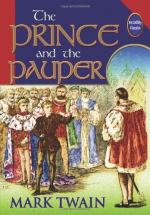But for one single dread, he could have seen the fourth day approach without serious distress—the dining in public; it was to begin that day. There were greater matters in the programme—for on that day he would have to preside at a council which would take his views and commands concerning the policy to be pursued toward various foreign nations scattered far and near over the great globe; on that day, too, Hertford would be formally chosen to the grand office of Lord Protector; other things of note were appointed for that fourth day, also; but to Tom they were all insignificant compared with the ordeal of dining all by himself with a multitude of curious eyes fastened upon him and a multitude of mouths whispering comments upon his performance,—and upon his mistakes, if he should be so unlucky as to make any.
Still, nothing could stop that fourth day, and so it came. It found poor Tom low-spirited and absent-minded, and this mood continued; he could not shake it off. The ordinary duties of the morning dragged upon his hands, and wearied him. Once more he felt the sense of captivity heavy upon him.
Late in the forenoon he was in a large audience-chamber, conversing with the Earl of Hertford and dully awaiting the striking of the hour appointed for a visit of ceremony from a considerable number of great officials and courtiers.
After a little while, Tom, who had wandered to a window and become interested in the life and movement of the great highway beyond the palace gates—and not idly interested, but longing with all his heart to take part in person in its stir and freedom—saw the van of a hooting and shouting mob of disorderly men, women, and children of the lowest and poorest degree approaching from up the road.
“I would I knew what ’tis about!” he exclaimed, with all a boy’s curiosity in such happenings.
“Thou art the King!” solemnly responded the Earl, with a reverence. “Have I your Grace’s leave to act?”
“O blithely, yes! O gladly, yes!” exclaimed Tom excitedly, adding to himself with a lively sense of satisfaction, “In truth, being a king is not all dreariness—it hath its compensations and conveniences.”
The Earl called a page, and sent him to the captain of the guard with the order—
“Let the mob be halted, and inquiry made concerning the occasion of its movement. By the King’s command!”
A few seconds later a long rank of the royal guards, cased in flashing steel, filed out at the gates and formed across the highway in front of the multitude. A messenger returned, to report that the crowd were following a man, a woman, and a young girl to execution for crimes committed against the peace and dignity of the realm.
Death—and a violent death—for these poor unfortunates! The thought wrung Tom’s heart-strings. The spirit of compassion took control of him, to the exclusion of all other considerations; he never thought of the offended laws, or of the grief or loss which these three criminals had inflicted upon their victims; he could think of nothing but the scaffold and the grisly fate hanging over the heads of the condemned. His concern made him even forget, for the moment, that he was but the false shadow of a king, not the substance; and before he knew it he had blurted out the command—




